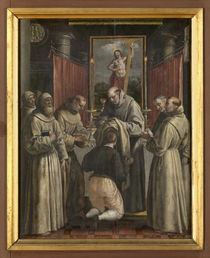The Catholic Defender: Saint Lawrence of Brindisi
- Donald Hartley

- Jul 21
- 3 min read
Deepertruth with special permission and aid with Franiciscan Media, a great team for the Lord

At first glance, perhaps the most remarkable quality of Lawrence of Brindisi is his outstanding gift of languages. In addition to a thorough knowledge of his native Italian, he had complete reading and speaking ability in Latin, Hebrew, Greek, German, Bohemian, Spanish, and French.
Lawrence was born on July 22, 1559, and died exactly 60 years later on his birthday in 1619. His parents William and Elizabeth Russo gave him the name of Julius Caesar, Caesare in Italian. After the early death of his parents, he was educated by his uncle at the College of St. Mark in Venice.
Lawrence of Brindisi, Lawrence also spelled Laurence, Italian San Lorenzo Da Brindisi, original name Cesare de Rossi, (born July 22, 1559, Brindisi, Kingdom of Naples [Italy]—died July 22, 1619, Belem, Portugal; canonized 1881; feast day July 21), doctor of the church and one of the leading polemicists of the Counter- ...

When he was just 16, he entered the Capuchin Franciscan Order in Venice and received the name of Lawrence. He completed his studies of philosophy and theology at the University of Padua and was ordained a priest at 23.
With his facility for languages Lawrence was able to study the Bible in its original texts. At the request of Pope Clement VIII, he spent much time preaching to the Jews in Italy. So excellent was his knowledge of Hebrew, the rabbis felt sure he was a Jew who had become a Christian.
Lawrence’s sensitivity to the needs of people—a character trait perhaps unexpected in such a talented scholar—began to surface. He was elected major superior of the Capuchin Franciscan province of Tuscany at the age of 31. He had the combination of brilliance, human compassion, and administrative skill needed to carry out his duties. In rapid succession he was promoted by his fellow Capuchins and was elected minister general of the Capuchins in 1602. In this position he was responsible for great growth and geographical expansion of the Order.
Lawrence was appointed papal emissary and peacemaker, a job which took him to a number of foreign countries. An effort to achieve peace in his native kingdom of Naples took him on a journey to Lisbon to visit the king of Spain. Serious illness in Lisbon took his life in 1619.
In 1956, the Capuchins completed a 15-volume edition of Lawrence’s writings. Eleven of these 15 contain his sermons, each of which relies chiefly on scriptural quotations to illustrate his teaching.

In 1596 he was appointed definitor general in Rome for the Capuchins. Pope Clement VIII assigned him the task of preaching to the Jews in the city. His knowledge of the Hebrew language was of great help in this regard. Beginning in 1599, Lawrence established Capuchin monasteries in modern Germany and Austria, furthering the Counter-Reformation and bringing many Protestants back to the Catholic faith.
His constant devotion to Scripture, coupled with great sensitivity to the needs of people, present a lifestyle which appeals to Christians today. Lawrence had a balance in his life that blended self-discipline with a keen appreciation for the needs of those whom he was called to serve.
In addition to a thorough knowledge of his native Italian, he had complete reading and speaking ability in Latin, Hebrew, Greek, German, Bohemian, Spanish, and French. Lawrence was born on July 22, 1559, and died exactly 60 years later on his birthday in 1619.
Lawrence was ordained a priest at the age of 23. Lawrence was beatified on 1 June 1783 and canonized as a saint on 8 December 1881.
John XXIII gives two primary reasons why he chose Lawrence of Brindisi as a Doctor of the Church. In this high and excellent man these two things are most important: apostolic zeal and mastery of doctrine: He taught with his word, he instructed with his pen, he fought with both.





















Comments